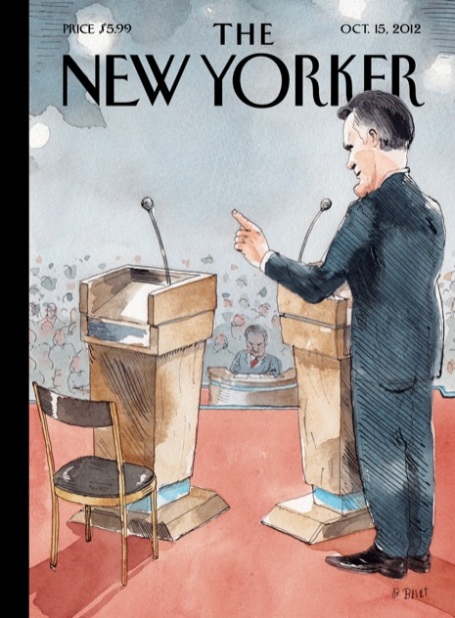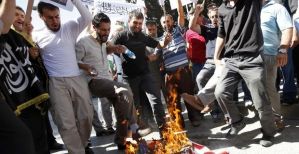As a graduate student studying Public Relations and Corporate Communication at NYU, I’m often talking about what individuals and businesses are doing, or could do, to better communicate and engage their audiences.
While we occasionally talk politics (especially with this being a Presidential election year) we mostly focus on companies and their communication strategies, or lack thereof. After watching the debate with some fellow PR&CC students at a SideBar (they have the most amazing hot dogs) I decided I’d share some, but not all, of my thoughts (from a PR perspective) about the debate.
The much-anticipated showdown between President Barack Obama and GOP presidential challenger Mitt Romney took place on Wednesday night. The debate was the first of three between the two contenders for the White House and offered Americans an unfiltered, all access view, of both men.
The debate presented each candidate with rewards and risks as the best spokesman for their campaign. Mitt Romney, whose campaign was on a slow decline throughout much of September, needed a strong showing to simply stay in the race. President Obama, who seemed to be finally pulling significantly ahead in the polls, needed a strong performance to finally knock his challenger out.
Both candidates tried to play down and mange their expectations prior to the debate. Romney, who has been painted by the media and Obama campaign as “stiff” and “robotic,” had the greater challenge. He had to overcome his communication problem. President Obama, who is often viewed as one of the most eloquent Presidential speakers we’ve ever had, simply had to show up and by himself. But, when the debate was over, it was apparent the President hadn’t shown up and that Mitt Romney was a good, if not great, orator.
Some simple media relation principles could have greatly enhanced and helped the President before, during and after the debate.
– Before: Preparation/Rehearsals: I can’t say this enough, “Practice, Practice, Practice.” A few days before the debate President Obama was quoted as telling volunteers that he found debate preparation a “drag.” By his performance, and the previous statement, it was clear that the President hadn’t taken debate practice and preparation seriously. As the best spokesperson for his campaign, he should have engaged in rigorous study of facts and numbers. Romney seemed to have an endless, well rehearsed, and oft used supply of them. The President should have gone over his storytelling (its how voters identify with compassion). In poll after poll the President leads when voters are asked if he can relate to their problems. But after the debate, Romney came across as the more compassionate of the two. Besides practicing against Sen. John Kerry, President Obama should have used and old trick of the trade and practiced in front of a mirror. This would have greatly enhanced the use of body language, unquestionably his weakest area. Managing body language is managing where you look, how you stand, and what pose or facial expression to take while not talking. The Presidents body language should have been indicative of wanting a second term, but came across as wanting anything but to be there, debating Mitt Romney.
– During: Body Language: There are numerous studies stating that body language has a stronger impact on communication than the spoken word. With an estimated audience of 65 million, President Obama’s body language came off as timid, lost, confused and at times arrogant. If he wanted to do any one thing during the debate, it was demonstrate that he was a capable, competent and sure leader, however, his body language made him come off as anything but. Even longtime supporters and liberal talking heads question weather he really wanted a second term. Many of those comments weren’t because of his colloquial nature, but because of the way his eyes, mouth and posture weren’t supporting what he was saying.
– After: Honesty: Politics is a game of persuasion. Most American’s now days don’t trust the media, or politicians, to tell them the truth. After the debate, President Obama’s surrogates and base, went livid on social media sites about the President loosing because he was so stunned by Mitt Romney’s lies (amongst other excuses: altitude, and body swapping). This created backlash for two reasons: Most Americans don’t like excuses. When you loose, you loose. Man up and admit it. After watching the President clearly get worked over, and looking unprepared, coming up with an excuse appeared weak. It would have been better to say, “I wasn’t as prepared as I should have been. I will be next time.” That’s an honest answer. He might have even added, something like, “between campaigning and running the country, I didn’t find as much time as I would have liked to prep.” That’s just some free advice, if it happens again. The other reason, even if Romney was repositioning, (another excuse/claim by the President and his supporters) President Obama just sat there and let him get away with it. Calling Romney out afterwards, when he could have done so to Mitt Romney’s face, makes the President look puny and feeble. It calls into question the Presidents ability to deal with criticism.
A few other takeaways:
1-The media may have been most culpable in the Presidents loss. The media hasn’t pressed, challenged and dug deep into this administration, namely the President. Seriously, think of all the pointless, articles about Romney’s dog, or Romney’s statement after the Libya fiasco (especially when Kerry was daily politicizing the deaths of US service members in 2004) or the charge that he may be a tax felon, compared to the media never seriously challenging the President on security issues or jobless rates (and the plans to fix it, without spending tax payer money and raising the deficit) and almost any other issue about his record over the last four years. We know more about whom the President is having parties (fundraising) with than what his plans are to get unemployed college graduates working. What was the result of all of this? A president who was, for the first time in a long time, confronted by someone who articulates is knowledgeable and not easily intimidated. How did the President handle that kind of open and honest hostility? Not well. If the media had been doing this for the last four years, this likely would not have been the case.
2-The Democratic Party is taking my advice and making sure the VP practices, practices, practices.
3-Believing your own story. You’ve all heard the old saying that if you tell a lie enough times, people will believe it. I can’t help wonder if the Obama team started to really believe that Romney was a cold, dispassionate robber baron. One who was stiff, robotic and uncompromising. They’ve been characterizing him that way since last year, and maybe they really started to think that’s who he was, but that’s not who we saw. They should have ready for whom Mitt Romney really is, a smart, well spoken, intelligent, competent, composed, compassionate man, who doesn’t suffer fools lightly. According to multiple interviews of Romney’s friends, employs and religious flock, essentially those who know him best.
4-It appears as if Clint Eastwood was right. He wasn’t just right… he was predicting the future.

